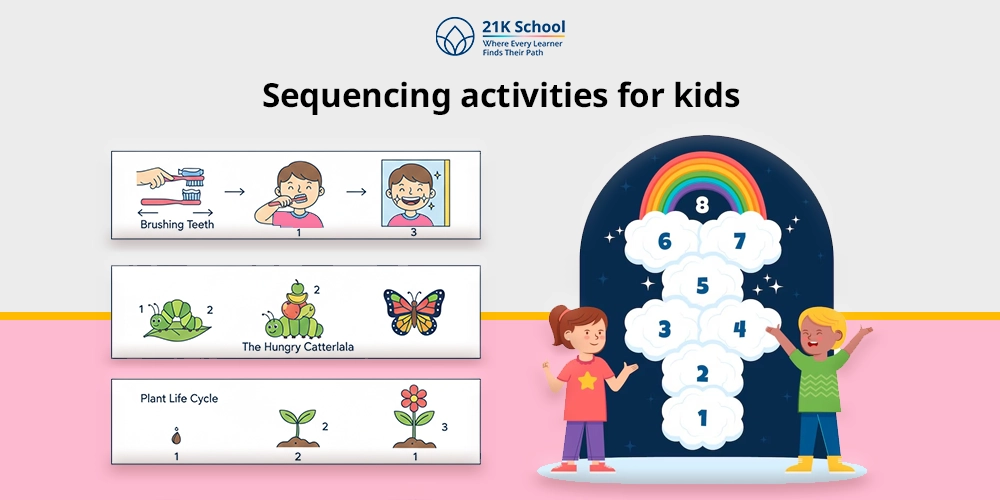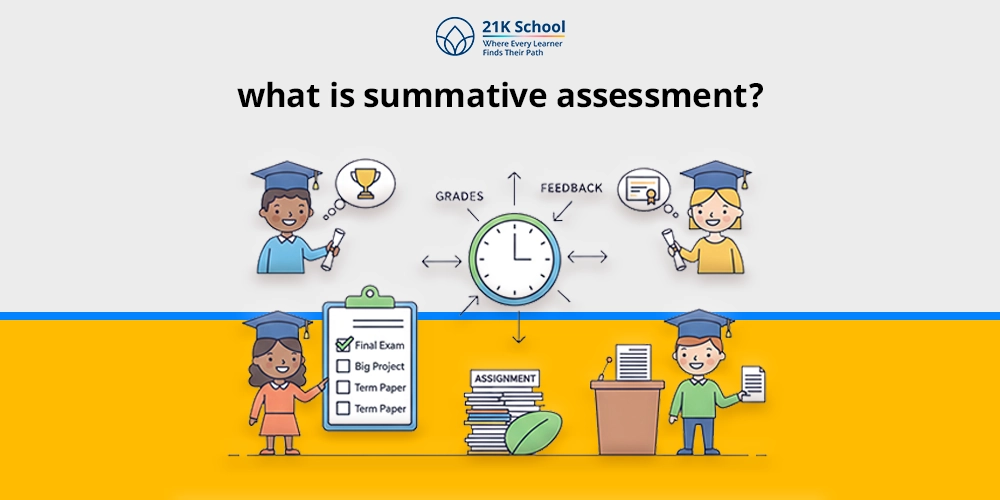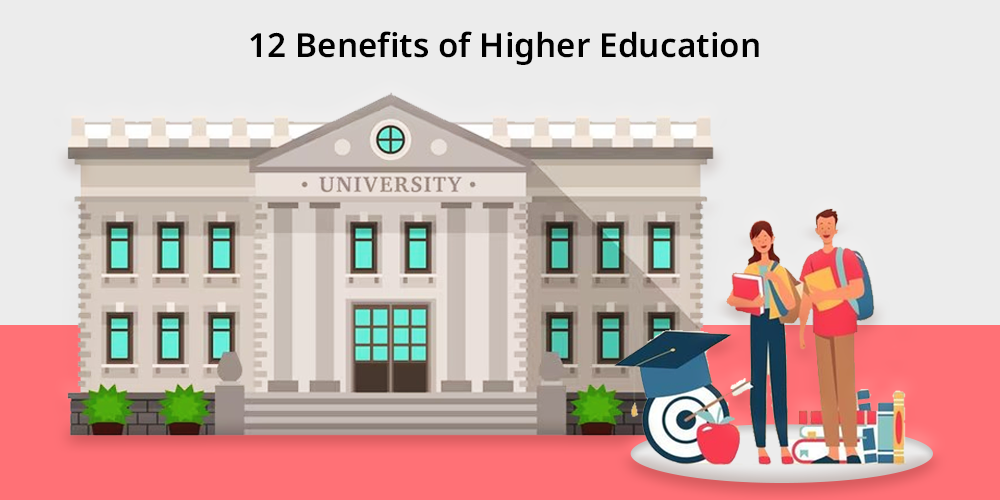
Higher education is often seen as a stepping stone to better jobs and a stable life. But in truth, it is so much more than that.
Beyond books and classrooms, higher education offers a powerful combination of personal growth, professional development, and social awareness.
In the ever-evolving world of today, the returns on higher education extend far beyond the conferral of a diploma. It shapes your perception, gives you greater skills, and gives you a life full of opportunities.
As a student, parent, or working individual contemplating additional education, knowing the long-term benefits of a college diploma will enable you to make informed decisions.
Let’s discuss the primary reasons why attending college remains one of the most influential choices you can make.
Contents
- Top 12 Benefits of Higher Education
- 1. Improved Career Prospects
- 2. Higher Earning Potential
- 3. Personal Growth and Development
- 4. Networking and Professional Connections
- 5. Better Healthcare and Living Standards
- 6. Societal Impact and Civic Engagement
- 7. Specialised Knowledge and Skill Building
- 8. Global Exposure and Cultural Understanding
- 9. Critical Thinking Skills
- 10. Improved Job Satisfaction
- 11. Build Confidence and Resilience
- 12. Road to Innovation and Entrepreneurship
- Final Thoughts
Top 12 Benefits of Higher Education
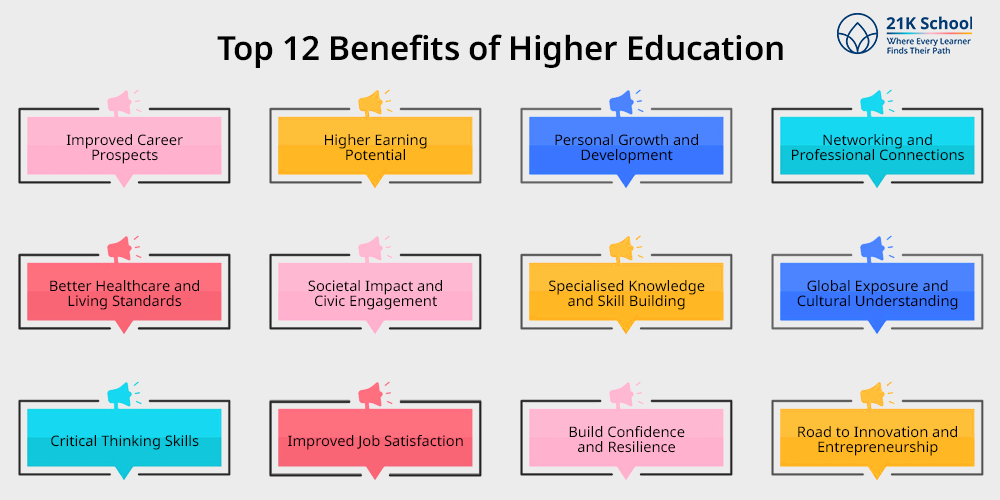
1. Improved Career Prospects
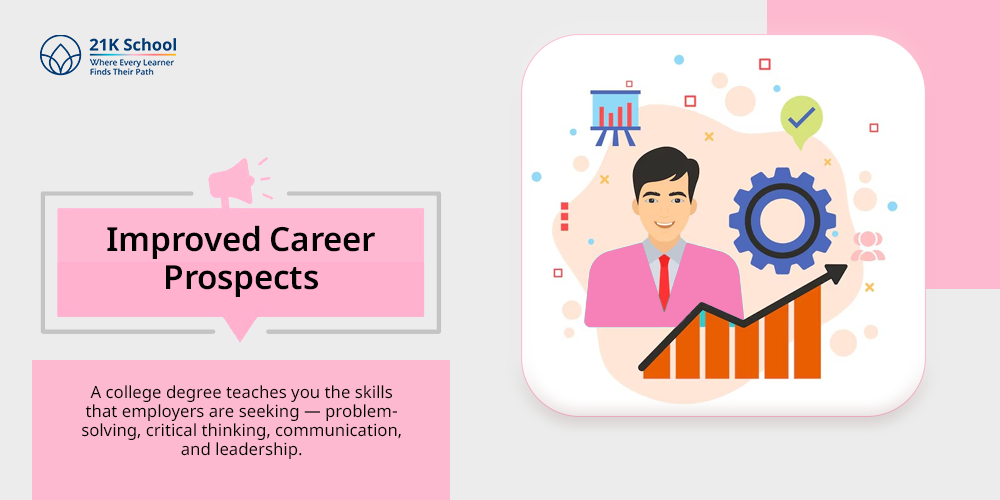
One of the most direct benefits of having a degree is greater access to high-paying career opportunities.
Most professional occupations today mandate no less than a bachelor’s degree, particularly in areas such as engineering, medicine, law, finance, data science, and teaching.
A college degree teaches you the skills that employers are seeking — problem-solving, critical thinking, communication, and leadership. It also serves to indicate commitment and discipline, making your application stand out.
With increased automation and AI taking over routine work, more jobs requiring higher-order thinking are emerging. Higher education equips you with the ability to qualify for those positions and future-proof your career.
2. Higher Earning Potential
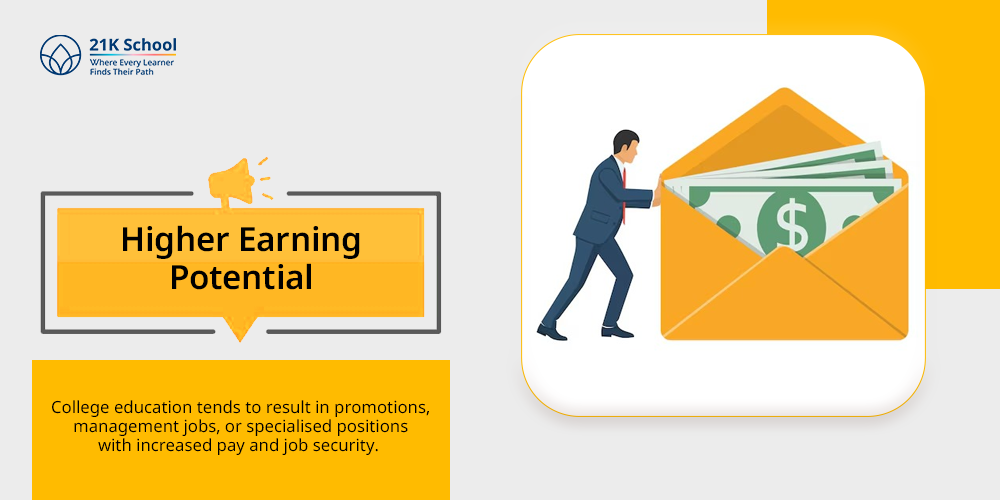
Many studies verify that a person with a college degree will earn more than one without it. It’s not only the paycheck; degree recipients are also more likely to enjoy other perks such as health insurance, time off, bonuses, and retirement savings plans.
College education tends to result in promotions, management jobs, or specialised positions with increased pay and job security. Even during recessionary periods, college graduates are less likely to be unemployed than non-graduates.
In a time of rising cost of living, investing in college education tends to translate into financial stability.
3. Personal Growth and Development
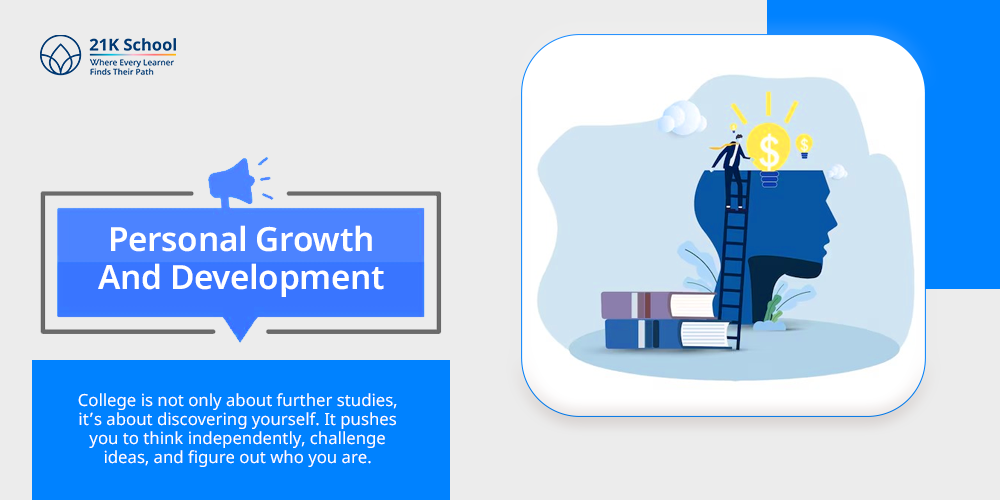
College is not only about further studies, it’s about discovering yourself. It pushes you to think independently, challenge ideas, and figure out who you are.
Self-reliance, time management, teamwork, and interacting with people from various backgrounds make you independent, self-assured, and accountable.
By assignments, group works, and presentations, you gain soft skills such as communication, flexibility, and emotional intelligence. These are important skills that you will use both in life and in your career.
Higher education offers a framework for this development, assisting you to bridge the gap from adolescence into adulthood with a better direction in life.
4. Networking and Professional Connections
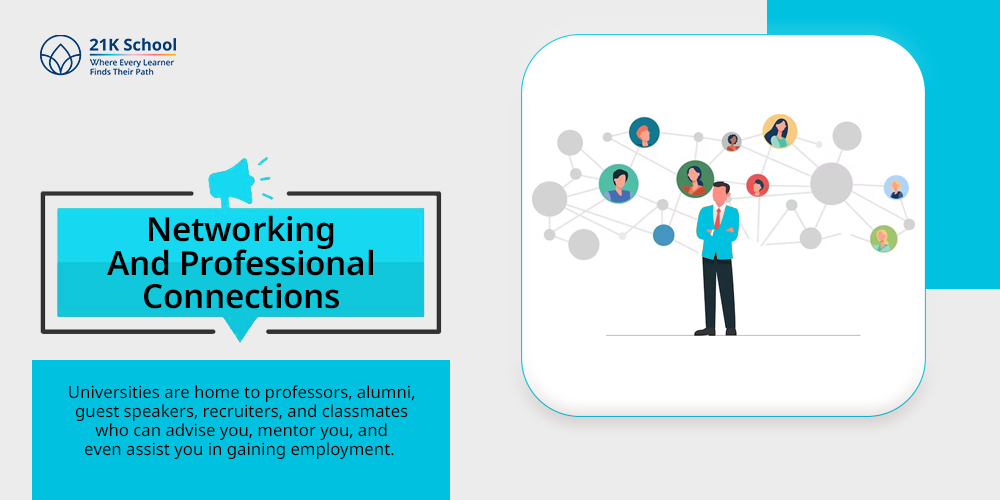
Universities are home to professors, alumni, guest speakers, recruiters, and classmates who can advise you, mentor you, and even assist you in gaining employment.
Internships, seminars, career days, and alumni gatherings expose you to actual professionals and industry leaders. These connections can result in referrals, collaborations, or job prospects down the line.
In the competitive job market today, networking is usually the way to go, and college is the ideal starting point to make those lasting connections.
5. Better Healthcare and Living Standards
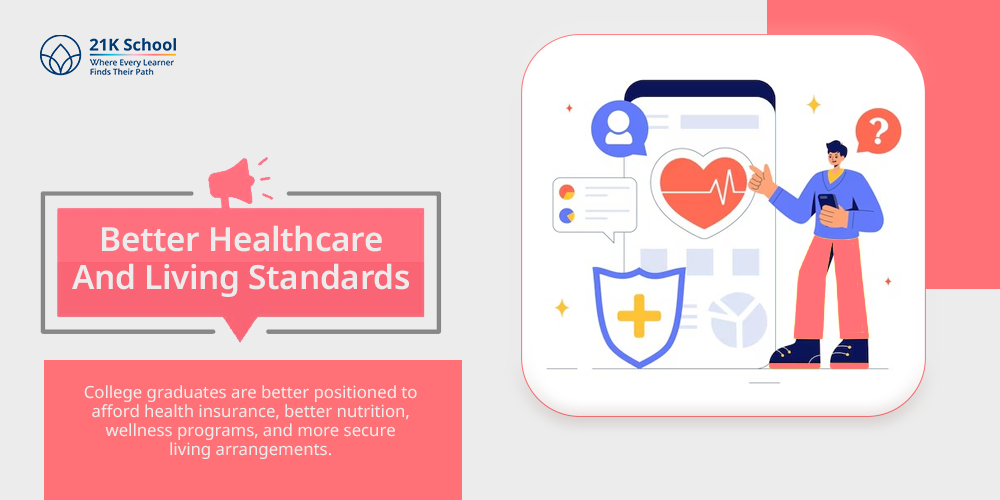
Education impacts more than your career; it can improve your quality of life. College graduates are better positioned to afford health insurance, better nutrition, wellness programs, and more secure living arrangements.
They are also more cognizant of the value of mental and physical health, resulting in healthier lifestyles such as regular exercise, balanced nutrition, and preventive health.
Due to improved earnings and benefits from work, they can provide good housing in secure neighbourhoods and improve their families’ living standard.
Ripple effects of higher education tend to last across generations, resulting in sustained family wellbeing.
6. Societal Impact and Civic Engagement
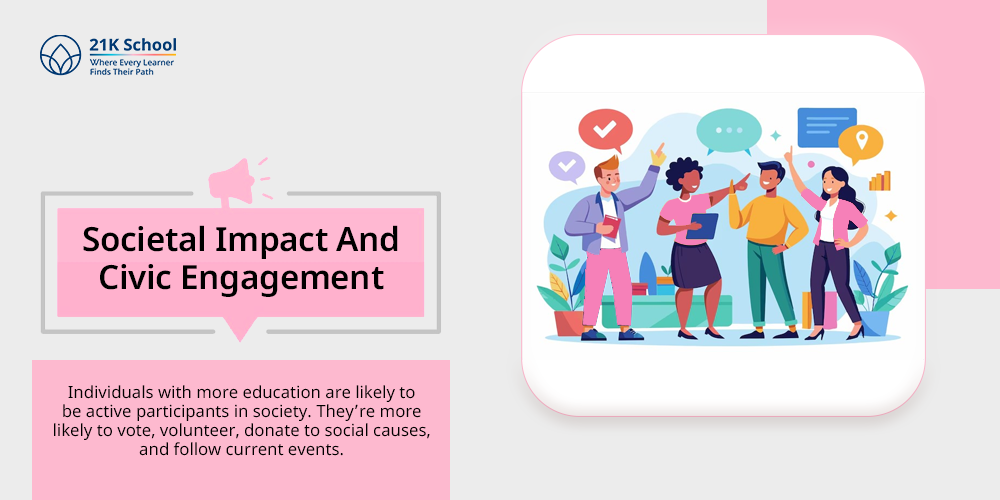
Individuals with more education are likely to be active participants in society. They’re more likely to vote, volunteer, donate to social causes, and follow current events.
Education encourages better comprehension of issues affecting society such as inequality, climate change, and health. This sensitizes them to have better civic duty and a want to contribute to society in a positive way.
Whether it’s through teaching, public policy, or volunteerism, graduates make a more educated, equitable, and humane world.
7. Specialised Knowledge and Skill Building
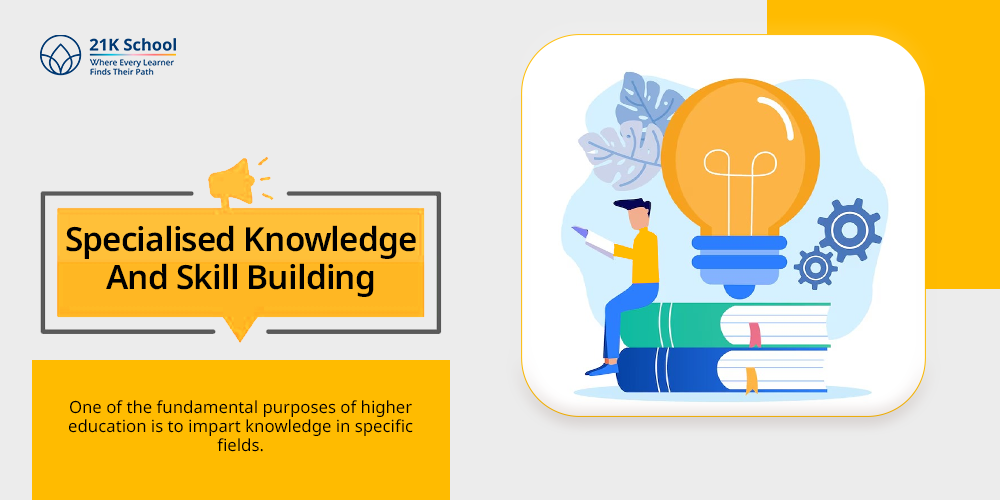
One of the fundamental purposes of higher education is to impart knowledge in specific fields. Whether you’re interested in medicine, technology, psychology, or design, a college education equips you in your field of interest.
You don’t only study theory, you acquire hands-on experience via labs, workshops, internships, and projects. This prepares you for a job and provides you with the belief to work on actual issues.
With changing industries, expertise turns into a very crucial asset. Being aware of the newest tendencies and methods keeps you a step ahead and provides chances for leadership positions in your field.
8. Global Exposure and Cultural Understanding
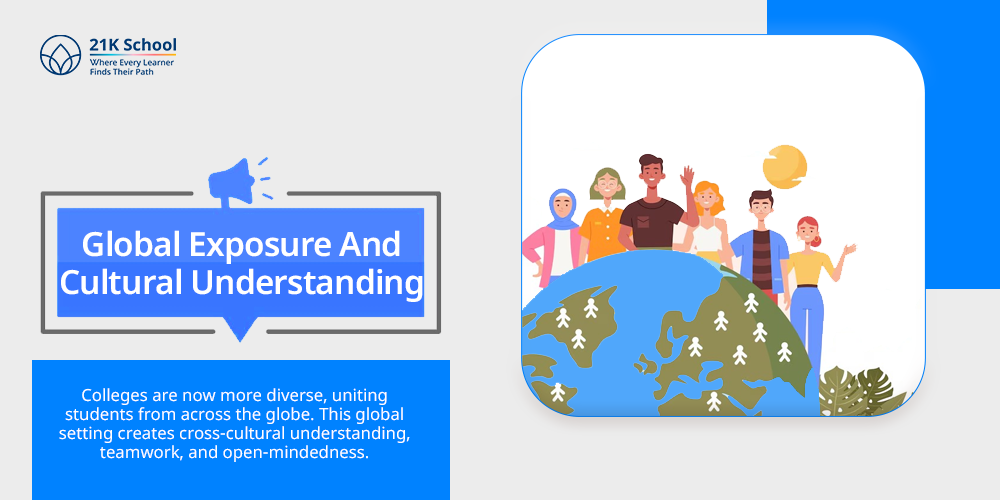
Colleges are now more diverse, uniting students from across the globe. This global setting creates cross-cultural understanding, teamwork, and open-mindedness.
You learn to work with individuals of other cultures, languages, and beliefs — a quality that is highly sought after in today’s global workforce. Study-abroad opportunities, international visitors, and multicultural celebrations provide further exposure.
This international thinking not only makes you a better professional but also enriches your life as a human being by acquiring empathy, tolerance, and a world view.
9. Critical Thinking Skills
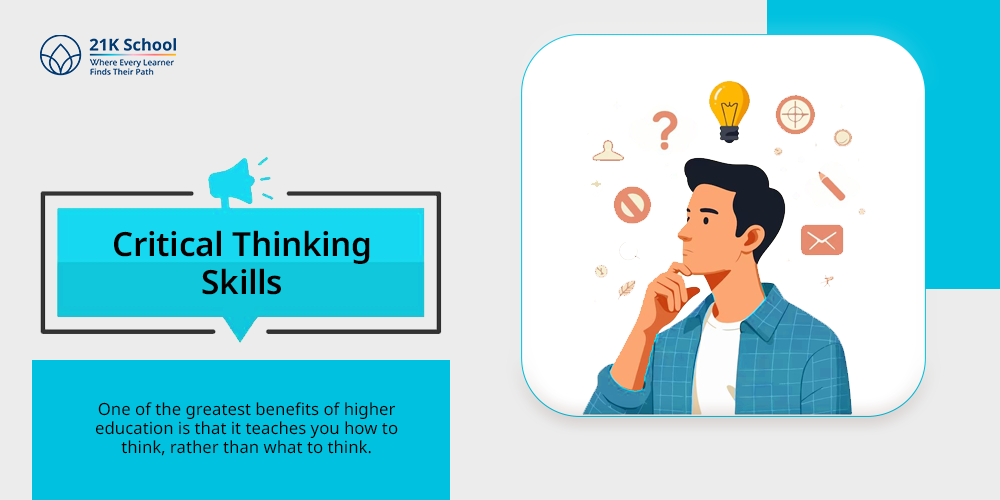
One of the greatest benefits of higher education is that it teaches you how to think, rather than what to think.
From reading texts to balancing intricate equations, college conditions your mind to question, analyse, and make logical decisions. Such critical thinking competencies are necessary in nearly every profession.
They enable you to gauge situations, compare alternatives, and reach conclusions on grounds of evidence instead of assumptions which is vital in today’s fast-paced world.
Whether you are running a business or making life choices, critical thinking ability places you way ahead in the game.
10. Improved Job Satisfaction
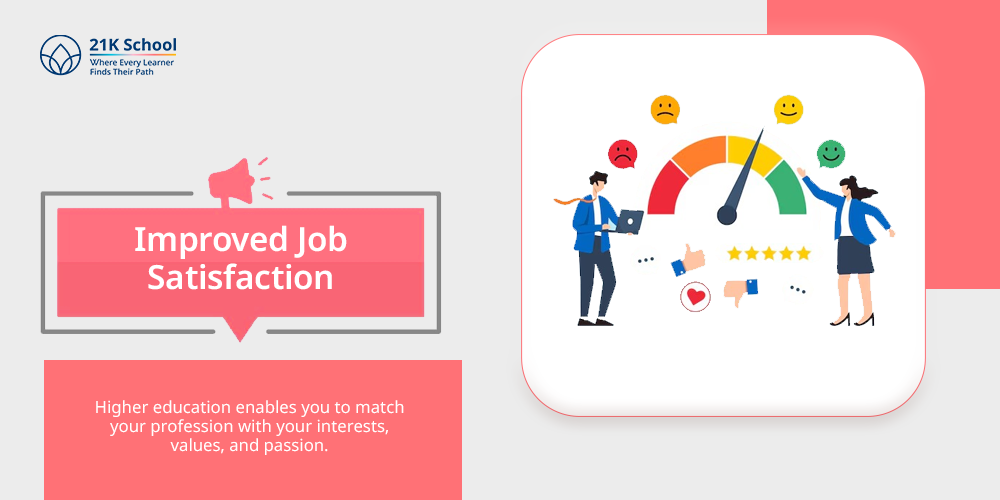
Working by actually doing something you enjoy begins with the proper education to enable you to do so. Higher education enables you to match your profession with your interests, values, and passion.
When you’re in a job that matches your ability and personality, you’re going to be more motivated and content. This results in improved mental health, improved performance, and a sense of purpose.
Job satisfaction also makes your relationships better, improves morale at work, and even benefits your community. Education enables you to select a career, not merely a job.
11. Build Confidence and Resilience
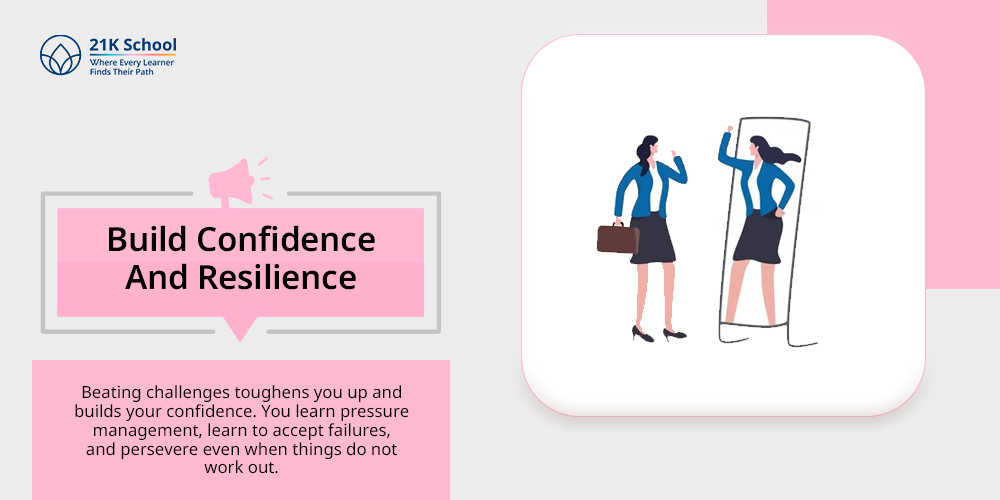
College life is a roller-coaster ride of highs and lows — challenging exams, close deadlines, conflicts in groups, the works. But these challenges do something invaluable for you: they teach you how to bounce back.
Beating challenges toughens you up and builds your confidence. You learn pressure management, learn to accept failures, and persevere even when things do not work out.
This way of thinking will carry you through life, in your career and in your personal relationships. Employers prize workers who remain level-headed during pressure situations and step up — both skills developed through higher education.
12. Road to Innovation and Entrepreneurship
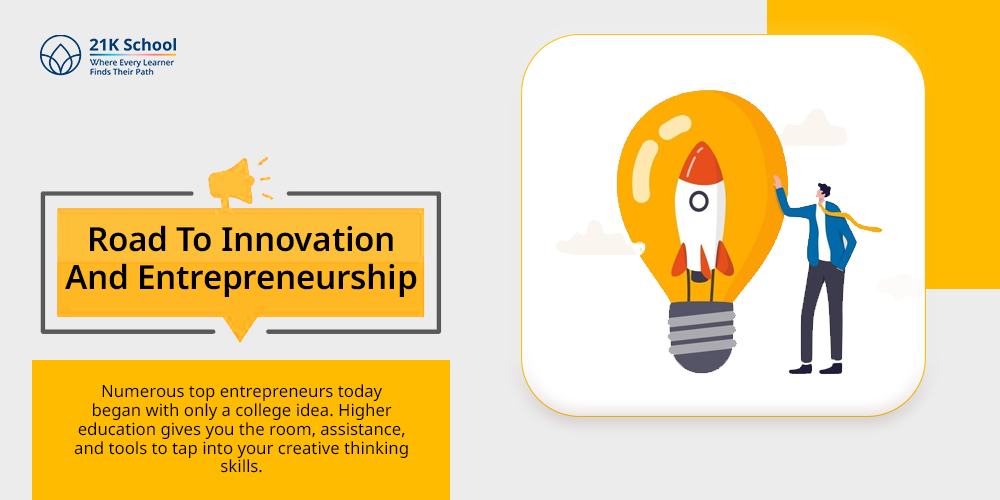
Numerous top entrepreneurs today began with only a college idea. Higher education gives you the room, assistance, and tools to tap into your creative thinking skills.
With business labs, tech incubators, and startup mentorship programs, students have the space to experiment, innovate, and create. You are taught to do research, develop a business plan, present ideas, and tackle actual problems.
From creating startups to addressing social challenges, higher education is where the future creators and changemakers learn.
Final Thoughts
The advantages of higher education extend far beyond finding a good career. It serves to unlock your true potential, form lasting relationships, gain valuable life skills, and contribute positively to society.
Whether you’re looking for career achievement, self-enrichment, or a higher standard of living, higher education provides you with the means to achieve it. It changes not just your future, but the futures of those close to you.
In an age full of change and uncertainty, investment in education is still one of the most dependable ways to a brighter tomorrow.

